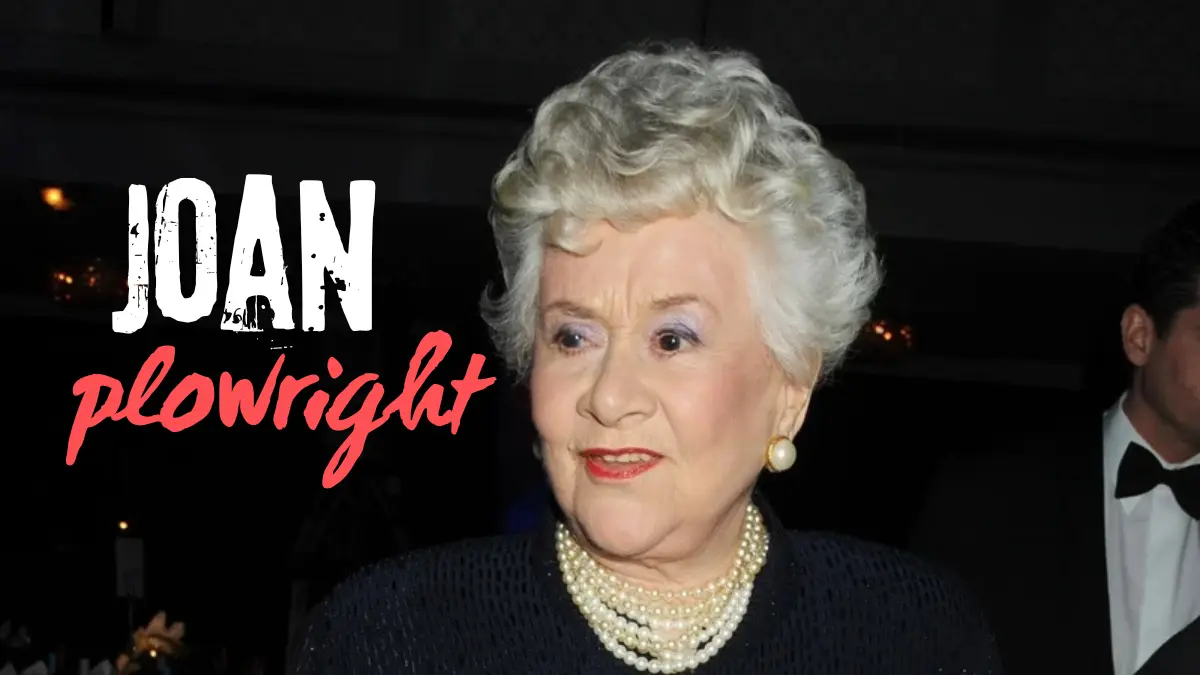Joan Plowright is a renowned English actress whose career has spanned more than six decades. With an incredible range and deep commitment to her craft, she earned widespread recognition for her exceptional acting ability. Over the years, Plowright’s performances have captivated audiences in a variety of roles, from stage productions to film and television. Her dedication to her craft and her ability to convey complex emotions made her one of the most respected actresses in the industry.
Born on October 28, 1929, in the working-class neighborhood of Brigg, Lincolnshire, England, Joan was raised in a modest household. Her early years were marked by a love of drama, but it wasn’t until she attended the Royal Academy of Dramatic Art (RADA) that she fully embraced her future as an actress. Plowright’s years at RADA were formative, giving her the necessary tools to navigate the world of acting and develop a unique style that would distinguish her from other performers.
Early Career and Theatre Work

Joan Plowright’s professional debut occurred in the early 1950s, when she was still honing her craft at RADA. By the time she was in her mid-twenties, she had already established herself as a capable stage performer. Her first major break came when she joined the Royal Shakespeare Company (RSC), one of the most prestigious theater companies in the world. Plowright’s association with the RSC marked the beginning of a long and illustrious career in the theater.
Throughout her career, she performed in numerous Shakespearean plays, including iconic roles such as Juliet in Romeo and Juliet and Lady Macbeth in Macbeth. Her performances in these classic works showcased her versatility, with critics praising her for her deep understanding of Shakespeare’s language and her ability to bring a modern sensibility to age-old characters. These stage roles were pivotal in her early career, and they cemented her place in the world of British theater.
In addition to Shakespeare, Plowright also took on roles in modern plays, particularly those written by some of the most acclaimed playwrights of her time. Her work in The Caretaker by Harold Pinter, for instance, highlighted her ability to tackle intense, complex material and to create deeply nuanced characters. She quickly gained a reputation as a performer who could embody both the emotional and intellectual demands of the works she was in.
While she found success on stage, Plowright’s versatility allowed her to transition seamlessly into film and television, where she would also leave a significant mark.
Transition to Film and Recognition
While Joan Plowright was already a respected name in theater, her foray into the world of film added a new layer to her already impressive career. In the late 1950s and early 1960s, she began taking on film roles, and it wasn’t long before her natural talent and screen presence made her a sought-after actress for both British and international films.
Her breakthrough in film came with her role in the 1964 film The Entertainer, directed by Tony Richardson. In this film, she starred alongside Laurence Olivier, another legendary actor who would play a pivotal role in her life both professionally and personally. Her portrayal in The Entertainer demonstrated her ability to hold her own next to such a prominent actor, and it earned her widespread critical acclaim.
Though Plowright had already made a name for herself in the theater, it was through her film roles that she gained wider international recognition. Over the years, she worked with some of the most respected filmmakers of the time, including John Frankenheimer, and appeared in films like A Fine Day for a Dying and The World’s End. These films gave audiences a chance to see a different side of Plowright, showcasing her ability to work in both dramatic and comedic genres.
Despite her growing fame on screen, Joan Plowright never abandoned her roots in theater. She often returned to the stage, where her performances continued to be praised for their depth and emotional range. This dual career in both theater and film became a defining aspect of her legacy.
Personal Life and Marriage to Laurence Olivier
One of the most notable aspects of Joan Plowright life, outside of her career, was her long and enduring marriage to the legendary actor Laurence Olivier. The two met in the 1960s, and their relationship quickly became one of the most talked-about unions in the entertainment world. Olivier, a towering figure in British theater and film, was already a star by the time he and Plowright became a couple. Despite their age difference—Olivier was more than 20 years older than Plowright—the two shared a profound love for each other and a mutual respect for their work.
The marriage between Joan Joan Plowright and Laurence Olivier was marked by both professional collaboration and personal devotion. Olivier, who had been previously married to actress Vivien Leigh, found in Joan Plowright a partner who both challenged and supported him in equal measure. The couple’s professional lives often overlapped, with Plowright appearing alongside Olivier in numerous productions, both on stage and in film.
Their relationship, however, was not without its challenges. Olivier’s declining health in the later years of their marriage, coupled with the demands of their respective careers, tested their bond. Nevertheless, the couple remained together until Olivier’s death in 1989. Joan Plowright, though devastated by his passing, continued to honor his legacy by remaining active in her own career.
Later Career and Continued Success
Even after Olivier’s death, Joan Plowright continued to be a prominent figure in both the theater and film worlds. Her late-career roles further demonstrated her incredible range as an actress, as she took on a variety of roles that spanned different genres and styles. In the 1990s and 2000s, she received critical acclaim for her performances in films such as Enchanted April, where she portrayed a character who is grappling with personal loss and transformation. Her portrayal in this film was both tender and powerful, and it showcased the depth that she brought to her later roles.
During this period, Joan Plowright also appeared in various stage productions, including The Importance of Being Earnest and Long Day’s Journey into Night, continuing to demonstrate her capacity for tackling complex, multifaceted characters.
Throughout her career, Joan Plowright received a number of accolades, including prestigious awards from the British Academy of Film and Television Arts (BAFTA) and the Laurence Olivier Awards, named after her late husband. She was also recognized for her contributions to the arts with honors such as a Dame Commander of the Order of the British Empire (DBE), an acknowledgment of her immense impact on both British and international theater.
Legacy and Influence
Joan Plowright legacy is one that will endure for many years to come. Her contributions to the world of theater, film, and television have left an indelible mark on the industry. As an actress, she demonstrated what it meant to fully commit to a role and to convey the complexity of human emotions through her performances. Whether she was performing Shakespeare on the stage or playing a deeply human character in a film, Joan Plowright dedication to her craft was always evident.
Beyond her acting, Joan Plowright’s influence on the world of theater and film is also reflected in her legacy as a mentor and role model for future generations of actors. Her tireless work ethic and pursuit of excellence set a high standard for those who followed in her footsteps. She has been admired for her grace, intelligence, and perseverance, qualities that have helped her maintain a remarkable career that continues to be remembered and respected by both her peers and audiences.
Joan Plowright remarkable career has spanned multiple generations, touching the hearts of audiences with her poignant and transformative performances. A true master of her craft, she has earned a place among the most celebrated figures in the entertainment world, a legacy that will continue to inspire and captivate for years to come.




